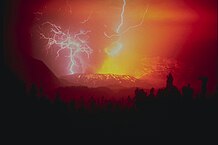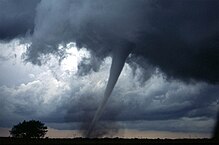Natural phenomenon
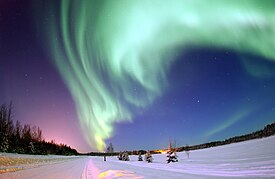
A natural phenomenon is an observable event which is not man-made. Examples include: sunrise, weather, fog, thunder, tornadoes; biological processes, decomposition, germination; physical processes, wave propagation, erosion; tidal flow, and natural disasters such as electromagnetic pulses, volcanic eruptions, and earthquakes.[1][2]
Exposure to forces of nature[vague] resulted in about 214,000 deaths in 2010, up from 31,000 in 1990.[3]
Types[edit]
Types of natural phenomena include, but are not limited to, the following.
Biological[edit]
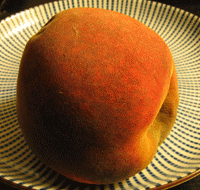
- Decomposition – by which organic substances are broken down into a much simpler form of matter
- Metabolism
- Catabolism
- Anabolism
- Fermentation – converts sugar to acids, gases and/or alcohol.
- Growth
- Population growth
- Overpopulation growth beyond carrying capacity
Chemical[edit]

Geological[edit]

Geological processes include erosion, sedimentation, and volcanic activities such as geysers and earthquakes.
Meteorological[edit]
Violent Meteorological phenomena are called storms. Regular, cyclical phenomena include seasons and atmospheric circulation. Climate change is often semi-regular.
-
Lightning strikes during the eruption of the Galunggung volcano in 1982
-
A tornado on May 3, 1999 in central Oklahoma
Atmospheric optical phenomena[edit]


- Aurora
- Crepuscular rays
- Green flash
- Haze
- Ice blink
- Light pillar
- Moonbow
- Moon dog
- Rainbow
- Subsun
- Sun dog
- Sunbow
- Water sky
Nuclear and Electrical[edit]
- Elementary particle interactions
- Supernova
-
Liquid hydrogen bubble chamber photograph of an anti-proton colliding with a proton
-
An effect of static electricity being observed
-
Supernova
Oceanographic[edit]
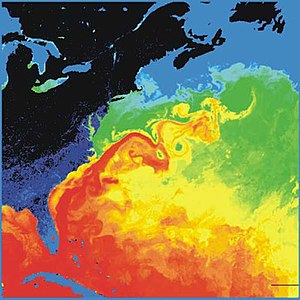
- Oceanographic phenomena include tsunamis, ocean currents and breaking waves.
See also[edit]
Some use of "" in your query was not closed by a matching "".Some use of "" in your query was not closed by a matching "".
References[edit]
| Wikimedia Commons has media related to Natural phenomena. |
- ↑ Missy Allen; Michel Peissel (1993). Dangerous natural phenomena. Chelsea House. ISBN 079101794X. Search this book on

- ↑ William R. Corliss (1977). Handbook of unusual natural phenomena. Sourcebook Project. ISBN 0915554011. Search this book on

- ↑ Rafael Lozano; et al. (December 15, 2012). "Global and regional mortality from 235 causes of death for 20 age groups in 1990 and 2010: a systematic analysis for the Global Burden of Disease Study 2010". Lancet. 380 (9859): 2095–128. doi:10.1016/S0140-6736(12)61728-0. PMID 23245604.
| This article about geography terminology is a stub. You can help EverybodyWiki by expanding it. |
This article "Natural phenomenon" is from Wikipedia. The list of its authors can be seen in its historical. Articles copied from Draft Namespace on Wikipedia could be seen on the Draft Namespace of Wikipedia and not main one.

